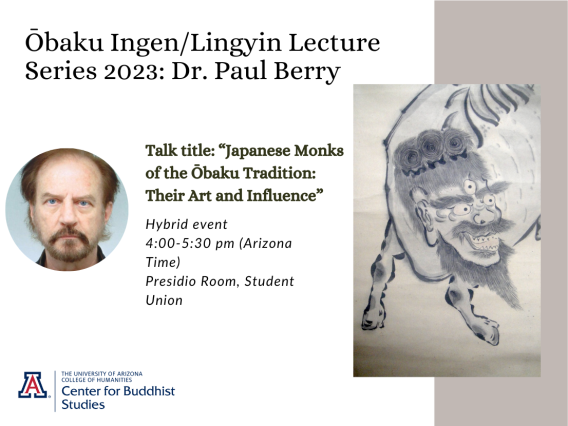
Dear Friends of the Center for Buddhist Studies,
Please join us on Tuesday, February 21 at 4 pm (Arizona Time) in the Presidio Room, Student Union for the next lecture of the Ōbaku Ingen/Lingyin Lecture Series! This is a hybrid event (in-person/zoom).
To receive a link to the webinar, please sign up for our email list here: http://eepurl.com/gb2yaD. If you are already on our list, please update your preference: go to your email inbox and find any of our emails you received before, then click the link to "update your preference" in the footer; select the group "Lectures and Academic Research" or "Ōbaku Ingen Events," you will receive an email of Zoom link soon. (See [Tutorial] How to Update Preferences for CBS Newsletter)
The year 2022 marks the 350th death anniversary of Zen Master Yinyuan Longqi (隱元隆琦 1592-1673, Ingen Ryūki in Japanese). Special ceremonies and events will be held in both Japan and China to honor this great Zen master. In North America, the Center for Buddhist Studies, College of Humanities at the University of Arizona is organizing a series of commemorative events which will run for one year beginning May 3, 2022. These events will present and explore the extraordinary life of Zen Master Yinyuan and the great achievements of the Huangbo 黃檗 Chan tradition (known as the Ōbaku school of Zen Buddhism in Japan) that Yinyuan pioneered in China and Japan. These events highlight the intersection between religion, art, and culture in China and Japan and will be presented in both online and offline formats. Activities will include an online exhibition of works of art related to the Ōbaku tradition, academic lectures, musical performances, and tea-related events. (Visit our Ōbaku Ingen website at: ingen.arizona.edu).
Time and Location:
Hybrid event
Time: 4:00-5:30 pm (Arizona Time)
Location: Presidio Room, Student Union
Address: 1303 E University Blvd, Tucson
Talk title: “Japanese Monks of the Ōbaku Tradition: Their Art and Influence”
Speaker: Dr. Paul Berry, Independent scholar
Abstract:
The influx of Chinese Chan (Zen) monks into Japan during the seventeenth and eighteenth centuries introduced aspects of calligraphy, painting, tea practices, seal carving, sculpture, and other forms of Chinese culture that were comparatively new to Japan. It is thus natural that the majority of scholarly efforts have been devoted to their activities and accomplishments. The dramatic impact of these immigrants bringing late Ming culture to Japan led early on to the conversion of some Japanese monks to the Ōbaku tradition. The ongoing arrival of Chinese priests tapered off by the mid-eighteenth century and thenceforth Ōbaku teachings were fully in the hands of their Japanese followers. Outside of a few famous figures, these Japanese priests have received comparatively little attention despite their varied accomplishments. This presentation provides a quick overview of some of the noted Japanese monks beginning with the Jikushian lineage of Dokushō (1617-1694), Gettan (1636-1713), Rankoku (1653-1707), and Tanzen (1683-1763). Shōzan’s (1634-1727) remarkable paintings of Kannon Bodhisattva will be introduced. A quick glance at the work of Tengan (act.from 1666-d. 1727) and Ryōnen (1647-1711) followed by thoughts about Baisaō (1675-1763) and some of his key disciples, Daichō (1678-1768), Goshin (1713-1785) and Monchū (1739-1829). The significance of the dramatic paintings of Kakutei (1722-1785) will proceed an account of Tanomura Chokunyū (1814-1907), a prominent literati painter, who became an Ōbaku priest and rebuilt the once famous Manpukuji sub-temple of Shishirin’in in Uji.
Speaker Bio:
Paul Berry is an independent scholar of Japanese art history and cinema living in Kyoto. He has taught at the University of Michigan, University of Washington, and Kansai Gaidai University, Osaka. His publications include Unexplored Avenues of Japanese Painting: The Hakutakuan Collection (University of Washington Press, 2001). He coauthored, with Michiyo Morioka, Modern Masters of Kyoto: The Transformation of Japanese Painting Traditions (Seattle Art Museum, 1999) and Literati Modern (Honolulu Academy of Arts, 2008). He contributed an essay to Poetic Imagination in Japanese Art: Selections from the Collection of Mary and Cheney Cowles (Portland Art Museum, 2020).
These lecture series are made possible thanks to the generous support from Wanfu Temple in Fuqing, Lingyin Temple in Hangzhou, and Matcha.com.
Please follow us on social media to receive future updates:
Facebook: Center for Buddhist Studies
Instagram: @UACBS
Twitter: @UACBSofficial
Center's website: cbs.arizona.edu
We look forward to seeing you there!


